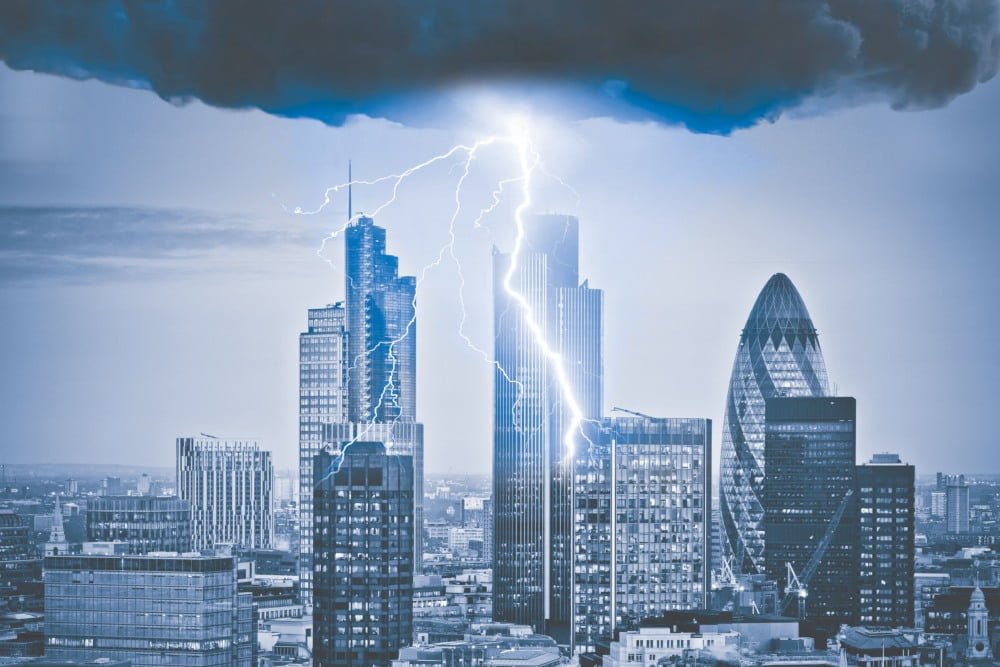All the latest figures from the global economy are pointing in the wrong direction. A growing sense of alarm is developing amongst the capitalist class. It is time to put their system out of its misery.
“It’s only when the tide goes out that you learn who has been swimming naked,” stated billionaire Warren Buffett not so long ago. In other words, things can look rosy up to a certain point. But when the situation turns, everything will be exposed.
This sums up the world economy at the present time: the tide is going out.
Synchronised slowdown
The global economy has entered a “synchronised slowdown”. This may be difficult to reverse in 2019, explains the latest update from the Brookings Institution think-tank. Economic data across the world has been deteriorating since last autumn they confirm. This is especially the case in China, the United States and Europe.
This deteriorating outlook has provoked warnings from Christine Lagarde, managing director of the IMF, who says the fund will cut its growth forecasts.
Things are not looking good for world capitalism. The Brookings-FT Tracking Index for the Global Economic Recovery compares real activity, financial markets and investor confidence with their historical averages for the global economy and for individual countries.
According to them, the index readings are at their lowest levels for both advanced and emerging capitalist economies since 2016 – the year of the weakest global economic performance since the slump of 2008.
Growth in Europe have been disappointing, economists note, with Italy in recession and Germany only narrowly avoiding it.
Out of ammo
 “Trade tensions and the uncertainty they have spawned are likely to leave a long-lasting scar on the world economy,” says Professor Eswar Prasad of the Brookings Institution. The nature of the slowdown has been “ominous”.
“Trade tensions and the uncertainty they have spawned are likely to leave a long-lasting scar on the world economy,” says Professor Eswar Prasad of the Brookings Institution. The nature of the slowdown has been “ominous”.
“High levels of public debt are likely to limit the ability of major advanced economies to counteract a slowdown with fiscal stimulus,” he adds. “Conventional monetary policy remains constrained in many advanced economies where policy rates are close to or below zero, while any further unconventional monetary policy actions present significant risks and uncertain payoffs.”
This gloomy scenario for world capitalism comes direct from the strategists of capital. They can see the dangers ahead but are paralysed about what to do to stop it. They used up all their economic weapons in the last slump. They are defenceless – naked – facing the next world slump, which is imminent.
A spectre is haunting the capitalists
 Key figures of global capitalism are therefore clearly concerned over the future of their system. Given the militancy of the yellow vests protests in France, as well as worldwide calls for system change by the youth climate strikes, more and more of the establishment are waking up to the prospect of revolution.
Key figures of global capitalism are therefore clearly concerned over the future of their system. Given the militancy of the yellow vests protests in France, as well as worldwide calls for system change by the youth climate strikes, more and more of the establishment are waking up to the prospect of revolution.
As a result, global leaders are sounding the alarm. Former chief economist of the IMF, Raghuram Rajan, for example, stated that: “I think capitalism is under serious threat because it stopped providing for the many, and when that happens, the many revolt against capitalism.”
This sentiment was echoed by French Finance minister Bruno Le Maire, who said: “If we want capitalism to hold together, work must be better paid…There comes a moment when workers won’t tolerate it any longer.”
They are closer to the truth than even they imagine.
These serious strategists of the establishment are waking up to what the Marxists have explained for years: that the crisis of capitalism is preparing the ground for almighty social explosions everywhere.
Despite the protestations of these bourgeois economists, there is nothing the ruling class can do to prevent this.
Offering aspirins
 The crisis of capitalism will not be resolved by merely redistributing some of the fruits of labour back to workers. No amount of tinkering can make capitalism ‘fairer’. Fundamental change is required. You cannot cure cancer with an aspirin. But aspirins are all that our concerned capitalist experts have to offer.
The crisis of capitalism will not be resolved by merely redistributing some of the fruits of labour back to workers. No amount of tinkering can make capitalism ‘fairer’. Fundamental change is required. You cannot cure cancer with an aspirin. But aspirins are all that our concerned capitalist experts have to offer.
The “rethinker of capitalism” Raghuram Rajan now calls for the establishment to “bring back balance” and “opportunity” to the communities hit by capitalism. But there can be no such thing as balance within a system based on exploitation. How can they bring about “balance” when 26 billionaires control more wealth than 3.8 billion people!
Capitalism is about making ever-greater profits for the few at the expense of the many. Even if some capitalists wanted to pay their workers well, they are prevented from doing so due to the competition of the market. Hence a race to the bottom in terms of pay for workers, whilst the profits of the bosses skyrocket.
It is all very well talking about creating “opportunities”. The reality is that when faced with a global system in crisis, the bosses are forced to close down factories, cut staff, and tighten the screws. Those that don’t will go bankrupt.
For example, economists at the investment firm Pimco suggest that in light of the downscaled growth prospects of only 0.8.% for 2019, German politicians should adopt “policies that create opportunities for the elderly to work longer”. This in a country where only recently the age of retirement has been pushed up to 67.
This is how big-business creates opportunities – the opportunity to work until you die!
Capitalism’s catastrophe
 These economists are correct to fear for the future of their system. Their pleas to the capitalists to reduce inequality will be drowned out by the cold logic of the market.
These economists are correct to fear for the future of their system. Their pleas to the capitalists to reduce inequality will be drowned out by the cold logic of the market.
The capitalist system has exhausted itself. It has reached its limits. As Marx explained, the limits to capitalism are capital itself. The very laws of capitalism generate their own barriers, culminating in crises of overproduction.
The capitalist economists are incapable of understanding this. They can see certain symptoms, but are blind to the contradictions. The fundamental one is that the working class cannot buy back the full value of what it produces.
While the capitalists can get around this temporarily through investment, this simply kicks the can down the road. Greater investment creates greater capacity, resulting in more commodities being pumped into the world economy. Sooner or later, this results in a slump as markets become saturated, unsold stock mounts up, and businesses fail to realise any profit.
The last slump in 2008 was the deepest in history. The next slump is likely to be far deeper.
Only the socialist transformation of society can avert this coming catastrophe. Only through the elimination of the anarchic system of production for profit and the introduction of a nationalised planned socialist economy – run under workers’ control and management – can production be run on the basis of satisfying human needs.
The capitalist system has outlived its usefulness. It needs to be put in the dustbin of history.






